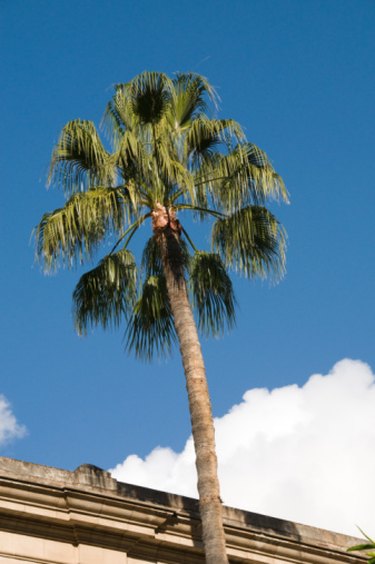Things You'll Need
Copper fungicide
Liquid palm fertilizer
Sprayer
Pruning shears

While subfreezing temperatures are detrimental or even deadly to some plants, most species of palm trees can recover fully if they experience a period of subfreezing weather and become damaged. One must be aware of the threat of rot and fungus when this happens, because the damaged tissues can become breeding grounds for these pathogens. If you notice your palm trees becoming damaged every year, you may eventually want to consider planting a hardier species of palm that can take the cold. Some can take brief temperature drops down to between 5 and 10 degrees Fahrenheit.
Step 1
Give a gentle tug on the spear. This is the newest emerging leaf in the center of the palm tree. If severely damaged, it will easily pull out. Remove all other brown and mushy material from the area where the spear was and apply copper fungicide at the recommended rate.
Video of the Day
Step 2
Spray the rest of the palm tree with copper fungicide. Do this even if the spear leaf did not pull out of the palm tree. This will prevent fungus and rot problems on the palm tree. Repeat this process 10 days after the first application.
Step 3
Spray any remaining green leaves with a liquid palm fertilizer. Follow the recommended rate on the fertilizer. This will help your palm tree begin to grow out of its cold-damaged state.
Step 4
Prune off all dead and dying fronds. These will either be brown or yellow. Leave all remaining green tissue on the palm as this is still alive.
Step 5
Withhold watering the palm tree until temperatures recover to summer levels. Cold, wet soil will further damage the tree by causing root rot.
Tip
If only some of the leaf material is brown, cut it back to the green tissue. Leaving as much green tissue as possible is important so the palm tree can continue to photosynthesize.
Video of the Day